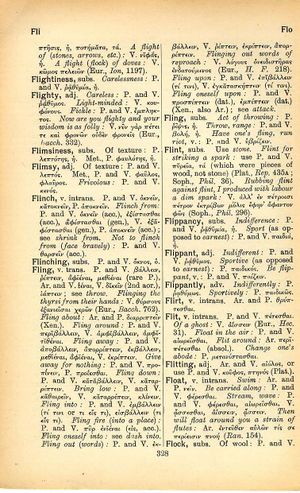flinch: Difference between revisions
From LSJ
τὸ δ' ἡδέως ζῆν καὶ ἱλαρῶς οὐκ ἔξωθέν ἐστιν, ἀλλὰ τοὐναντίον ὁ ἄνθρωπος τοῖς περὶ αὑτὸν πράγμασιν ἡδονὴν καὶ χάριν ὥσπερ ἐκ πηγῆς τοῦ ἤθους προστίθησιν → but a pleasant and happy life comes not from external things, but, on the contrary, man draws on his own character as a source from which to add the element of pleasure and joy to the things which surround him
(CSV4) |
m (Woodhouse1 replacement) |
||
| Line 1: | Line 1: | ||
{{Woodhouse1 | {{Woodhouse1 | ||
|Text=[[File:woodhouse_328.jpg|thumb|link={{filepath:woodhouse_328.jpg}}]] | |Text=[[File:woodhouse_328.jpg|thumb|link={{filepath:woodhouse_328.jpg}}]] | ||
P. and V. ὀκνεῖν, κατοκνεῖν, P. ἀποκνεῖν. | ===verb intransitive=== | ||
[[prose|P.]] and [[verse|V.]] [[ὀκνεῖν]], [[κατοκνεῖν]], [[prose|P.]] [[ἀποκνεῖν]]. | |||
[[flinch from]]: [[prose|P.]] and [[verse|V.]] [[ὀκνεῖν]] (acc.), [[ἐξίστασθαι]] (acc.), [[ἀφίστασθαι]] (gen.), [[verse|V.]] [[ἐξαφίστασθαι]] (gen.), [[prose|P.]] [[ἀποκνεῖν]] (acc.); see [[shrink from]]. | |||
[[not to flinch from]] ([[face bravely]]): [[prose|P.]] and [[verse|V.]] [[θαρσεῖν]] (acc.). | |||
}} | }} | ||
Revision as of 08:54, 20 May 2020
English > Greek (Woodhouse)
verb intransitive
P. and V. ὀκνεῖν, κατοκνεῖν, P. ἀποκνεῖν.
flinch from: P. and V. ὀκνεῖν (acc.), ἐξίστασθαι (acc.), ἀφίστασθαι (gen.), V. ἐξαφίστασθαι (gen.), P. ἀποκνεῖν (acc.); see shrink from.
not to flinch from (face bravely): P. and V. θαρσεῖν (acc.).

